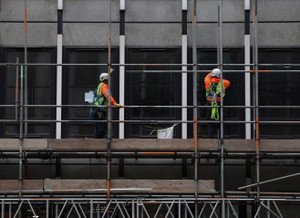UK tackles infrastructure 'blockers' by cutting legal challenge options
Published by Global Banking & Finance Review®
Posted on January 23, 2025
2 min readLast updated: January 27, 2026

Published by Global Banking & Finance Review®
Posted on January 23, 2025
2 min readLast updated: January 27, 2026

The UK government is limiting legal challenges to infrastructure projects to boost economic growth, targeting NIMBY groups and planning delays.
LONDON (Reuters) - Britain will make it easier for major infrastructure projects to go ahead by limiting the number of legal challenges that opposition groups can bring, the government said on Thursday.
Since coming to office in July, Prime Minister Keir Starmer has identified planning delays as a major impediment to economic growth. That growth underpins all his government's plans for the next five years, but has so far proved difficult to generate.
Projects such as nuclear plants, railway lines and wind farms can face years-long delays in Britain, where even legal challenges deemed to have little chance of success can be brought back to the courts three separate times.
Starmer said new rules would ensure that in the weakest cases only one such challenge can be made, as he pledged to take on NIMBY, or "Not In My Back Yard", pressure groups.
"For too long, blockers have had the upper hand in legal challenges – using our court processes to frustrate growth," Starmer said in a statement.
"We're putting an end to this challenge culture by taking on the NIMBYs and a broken system that has slowed down our progress as a nation."
The government said it wanted to strike a balance between ensuring protection for genuine cases while pushing back against a "challenge culture" where small groups use the courts to block decisions taken by elected officials.
It cited a number of examples including the Sizewell C nuclear power plant, which was delayed by two years despite the High Court describing aspects of a legal challenge to it as "utterly hopeless".
The government will scrap the first legal challenge, known as the paper permission stage. It will also change the law so that in cases where a High Court judge has deemed a challenge "Totally Without Merit", it will not be possible to ask the Court of Appeal to reconsider.
(Reporting by Sachin Ravikumar; editing by William James)
The UK government is limiting the number of legal challenges that opposition groups can bring to make it easier for major infrastructure projects to proceed.
Prime Minister Keir Starmer is leading the initiative, having identified planning delays as a significant barrier to economic growth.
NIMBY stands for 'Not In My Back Yard,' referring to local opposition groups that challenge infrastructure projects. The government aims to counter their influence on legal challenges.
The government plans to scrap the initial legal challenge stage and will limit subsequent challenges in cases deemed weak by the High Court.
The Sizewell C nuclear power plant is cited as an example, which faced a two-year delay despite the High Court labeling its legal challenge as 'utterly hopeless.'
Explore more articles in the Finance category
